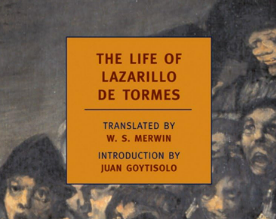Chapter VII: How Lazaro Went to Work for a Constable and Then What Happened to Him
byChapter VII begins with Lazarillo reaping the fruits of a lifetime spent dodging misfortune and adapting with wit. No longer the boy scrambling for crusts or running from cruel masters, he now walks through the streets in respectable clothes purchased with money he earned. His role as a chaplain’s water carrier behind him, he tries his hand briefly at being a bailiff. That job, however, quickly reveals its dangers when faced with outlaws and desperate criminals. Realizing that courage without a sword is a fast path to a grave, he steps away from the post. What follows is not retreat, but recalibration. His desire shifts from ambition to stability, from chasing rank to building something that will last.
In time, an opportunity presents itself—not through violence or toil, but through divine alignment, or so Lazarillo believes. A government position becomes available: town crier. This job requires no blade, only a voice loud enough to echo across market squares. It suits him. He becomes known not as a beggar or a burden, but as a man who carries news and value. His name travels with announcements, and with each passing week, his role becomes more than just functional—it becomes respectable. The position places him under the eye of the Archpriest of San Salvador, who, noting Lazarillo’s growing influence and trustworthiness, offers something unexpected. His maid, unmarried and practical, becomes Lazarillo’s wife. This arrangement, while born of convenience, brings Lazarillo a kind of domestic comfort he never thought possible.
Marriage brings with it not just companionship but a deepening of ties with the church. The archpriest makes sure their home is always stocked—flour, meat, bread, and even the old priest’s used socks are sent to them with care. Lazarillo does not question the generosity. He sees it as a reward, not just for loyalty but for knowing how to remain useful without overstepping. Yet whispers begin. Neighbors talk. The closeness between the archpriest and his wife invites suspicions. Some say she’s more than a servant. Others hint at a past, at children hidden or abandoned. The gossip, while biting, never fully surfaces in confrontation. It lingers, cruel and thin, like smoke over a fire no one wants to admit is burning.
The archpriest, sensing the tension, tells Lazarillo plainly that people will always talk. What matters, he says, is the life they live and the benefits they enjoy. He urges Lazarillo not to ruin good fortune chasing shadows. Lazarillo, worn by years of scarcity and beaten down by reality, chooses not to fight what he cannot prove. He tells himself that peace often comes not from innocence but from acceptance. He begins to care less about what might be true and more about what is useful. And in this balance—this deliberate ignorance—he finds a kind of peace. He eats well. His home is warm. His name is known, and no one strikes him in the street. This, for Lazarillo, is victory.
His story ends not with triumph in battle or a rise to nobility, but with a quiet, grounded stability. It’s not a fairy tale—it’s a survival tale. One built not on heroic deeds, but on clever endurance. Lazarillo has become the kind of man who can live with discomfort, so long as it is dressed in comfort. The rumors may bite, but they do not starve him. And so he keeps walking, not with pride, but with enough to get through each day. His past taught him that fate rarely smiles twice. So when it does, even if that smile hides secrets, he keeps it close and doesn’t ask too many questions.

